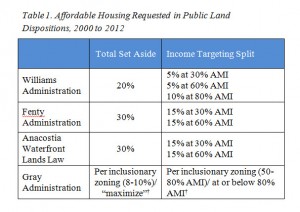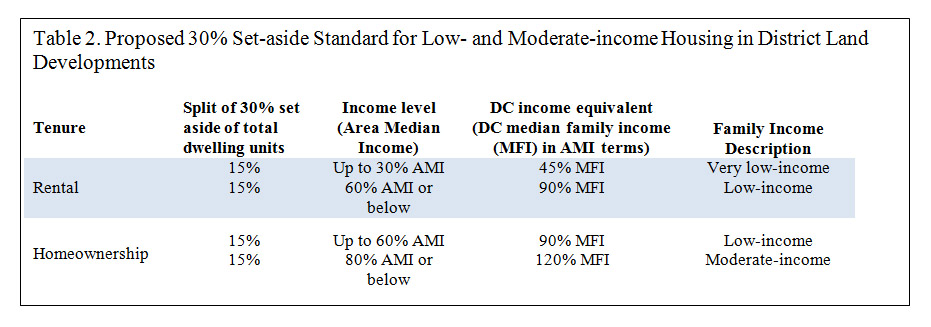Please accept these comments on behalf of the Coalition for Smarter Growth. We are a regional organization based in the District of Columbia focused on ensuring transportation and development decisions are made with genuine community involvement and accommodate growth while revitalizing communities, providing more housing and travel choices, and conserving our natural and historic areas.
Recommit to leveraging public land dispositions for very low income housing in mixed use projects
 We know that while the city has grown in population and income, low income D.C. residents are experiencing even greater difficulties finding housing they can afford. Thus public lands, and every other realistic tool we have available, should be used to help address this pressing need. Our recent report, Public Land for Public Good, shows that the District has and can do great things with its city-owned land. The creation of mixed income housing opportunities on public land is an important source of affordable housing for our residents.
We know that while the city has grown in population and income, low income D.C. residents are experiencing even greater difficulties finding housing they can afford. Thus public lands, and every other realistic tool we have available, should be used to help address this pressing need. Our recent report, Public Land for Public Good, shows that the District has and can do great things with its city-owned land. The creation of mixed income housing opportunities on public land is an important source of affordable housing for our residents.
We highlight the Hine Jr. High School redevelopment project next to the Eastern Market Metro station as a leading example of what a public land disposition should do. The project will offer a great mix of uses, close to 30 percent affordable housing, and a design compatible with a historic district. All of this occurs next to a Metro station, close to the core of the city. The project has been in process since 2008 when the former school site was offered for redevelopment. The project will provide 163,000 square feet of office space, 40,000 s.f. of retail, and a total of 159 housing units. Of the total, 46 units will be affordable, or 29 percent. The mix of affordability for the housing units is a good example of what the city should be seeking in LDAs: 5 units will be affordable at 30 percent AMI, 29 units at 60 percent AMI, 12 units at 80 percent AMI (in lieu of IZ). Other public benefits include reconstruction and opening of a block of C Street SE, and a public plaza along C Street.
The Hine School project pre-dates the current administration. We are concerned that the commitment to affordable housing in recent solicitations for public land dispositions, especially at the lowest income level, is declining. I would be surprised if a DMPED Land Disposition Agreement (LDA) ever again results in 30 percent AMI housing. Current practice by DMPED asks that any residential component meet or exceed Inclusionary Zoning standards of 8-10 percent set aside at 50-80% AMI. IZ is the law and what is required for any residential development. We should expect much more for public land.
Table 1 shows the affordable housing set side and income targeting that was the practice of the last decade for solicitations in public land dispositions. Currently, DMPED’s solicitations provide little of the specificity that was the practice in the past. We urge the council to ensure that we are making the most of the unique opportunity to leverage the value of the District’s land to create more affordable housing through the land disposition process. We ask that the council recommit the District to clearly requesting and prioritizing proposals that offer substantial amounts of affordable housing, including units affordable to those earning 30 percent AMI. As was the practice in the past, we ask that requests specify the city is seeking 20 percent to 30 percent of the total number of residential units affordable at 30 percent and 60 percent AMI for rentals, and up to 80 percent AMI for ownership. We suggest table 2 as a model. In addition, we ask that DMPED better coordinate with other agencies to pool resources to ensure the production of housing affordable at deeply affordable levels as a part of larger mixed income or all-affordable development.
Management of Affordable Dwelling Units
Since 2009, DHCD created a group to manage affordable dwelling units (ADUs) created through LDAs and Zoning Commission actions, along with IZ units. Given the many challenges to helping moderate and low income households buy and maintain affordable homes, we suggest that this process might be best done through DHCD contracting with a qualified nonprofit. Resale assistance for a price controlled home could benefit from extra attention that a nonprofit could provide to a seller. While we have suggested this for IZ units, we also think that ADU management would similarly benefit.
Thank you for your consideration.
Sincerely,
Cheryl Cort
Policy Director

